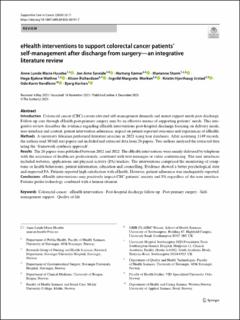| dc.contributor.author | Husebø, Anne Marie Lunde | |
| dc.contributor.author | Søreide, Jon Arne | |
| dc.contributor.author | Kørner, Hartwig | |
| dc.contributor.author | Storm, Marianne | |
| dc.contributor.author | Wathne, Hege Bjøkne | |
| dc.contributor.author | Richardson, Alison | |
| dc.contributor.author | Morken, Ingvild Margreta | |
| dc.contributor.author | Urstad, Kristin Hjorthaug | |
| dc.contributor.author | Nordfonn, Oda Karin | |
| dc.contributor.author | Karlsen, Bjørg | |
| dc.date.accessioned | 2024-03-08T10:15:08Z | |
| dc.date.available | 2024-03-08T10:15:08Z | |
| dc.date.created | 2024-01-26T09:53:43Z | |
| dc.date.issued | 2024 | |
| dc.identifier.citation | Supportive Care in Cancer. 2024, 32 (1), 11 | en_US |
| dc.identifier.issn | 0941-4355 | |
| dc.identifier.uri | https://hdl.handle.net/11250/3121529 | |
| dc.description.abstract | Introduction: Colorectal cancer (CRC) creates elevated self-management demands and unmet support needs post-discharge. Follow-up care through eHealth post-primary surgery may be an effective means of supporting patients’ needs. This integrative review describes the evidence regarding eHealth interventions post-hospital discharge focusing on delivery mode, user-interface and content, patient intervention adherence, impact on patient-reported outcomes and experiences of eHealth. Methods: A university librarian performed literature searches in 2021 using four databases. After screening 1149 records, the authors read 30 full-text papers and included and extracted data from 26 papers. Two authors analysed the extracted data using the ‘framework synthesis approach’. Results: The 26 papers were published between 2012 and 2022. The eHealth interventions were mainly delivered by telephone with the assistance of healthcare professionals, combined with text messages or video conferencing. The user interfaces included websites, applications and physical activity (PA) trackers. The interventions comprised the monitoring of symptoms or health behaviours, patient information, education and counselling. Evidence showed a better psychological state and improved PA. Patients reported high satisfaction with eHealth. However, patient adherence was inadequately reported. Conclusions: eHealth interventions may positively impact CRC patients’ anxiety and PA regardless of the user interface. Patients prefer technology combined with a human element. | en_US |
| dc.language.iso | eng | en_US |
| dc.relation.uri | 10.1007/s00520-023-08191-7 | |
| dc.rights | Navngivelse 4.0 Internasjonal | * |
| dc.rights.uri | http://creativecommons.org/licenses/by/4.0/deed.no | * |
| dc.title | eHealth interventions to support colorectal cancer patients’ self-management after discharge from surgery : an integrative literature review | en_US |
| dc.type | Peer reviewed | en_US |
| dc.type | Journal article | en_US |
| dc.description.version | publishedVersion | en_US |
| dc.source.volume | 32 | en_US |
| dc.source.journal | Supportive Care in Cancer | en_US |
| dc.source.issue | 1 | en_US |
| dc.identifier.doi | 10.1007/s00520-023-08191-7 | |
| dc.identifier.cristin | 2234975 | |
| dc.source.articlenumber | 11 | en_US |
| cristin.ispublished | true | |
| cristin.fulltext | original | |
| cristin.qualitycode | 1 | |

